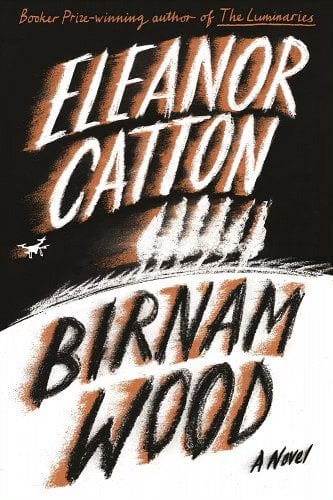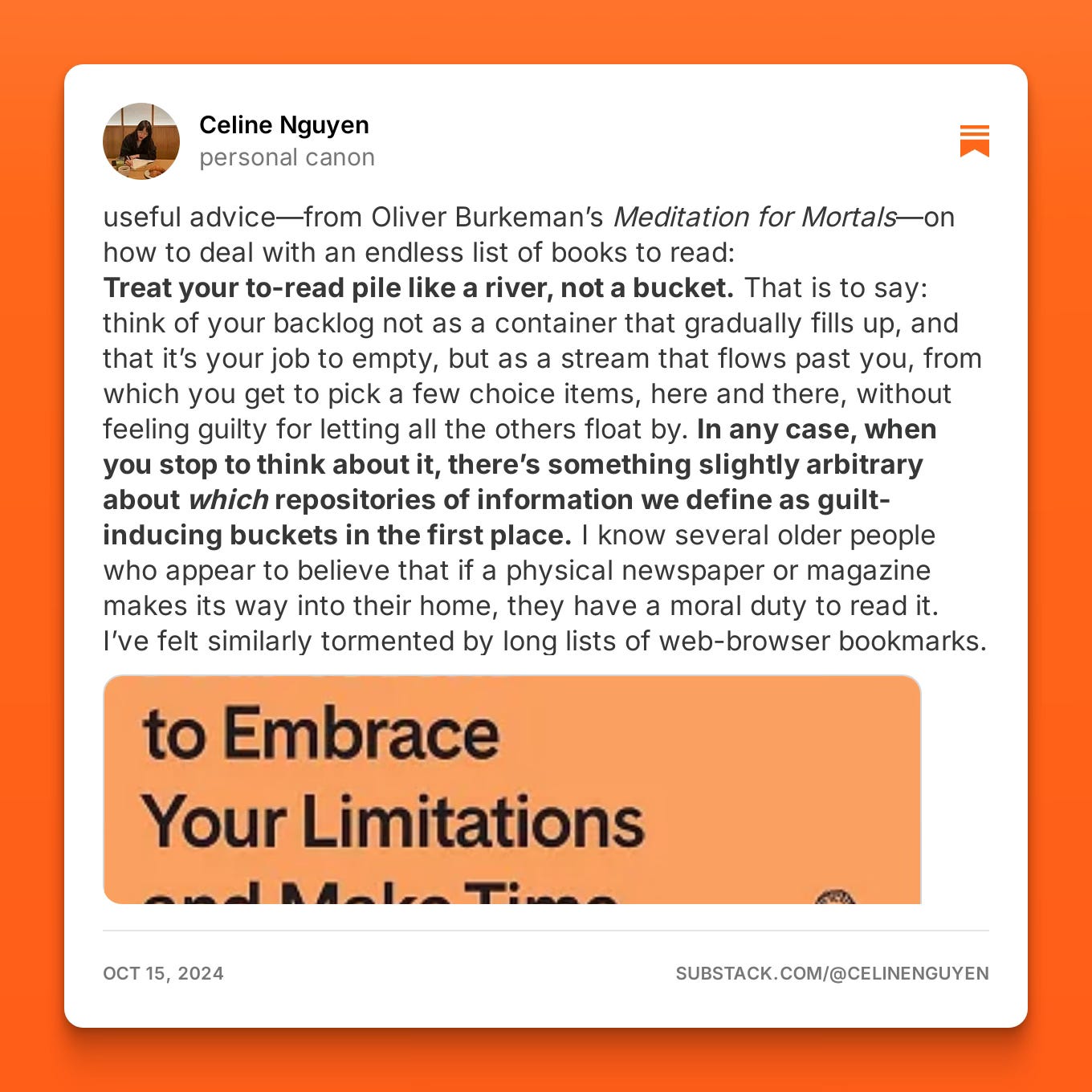Hello, readers.
I’ve got a quick and dirty review of Eleanor Catton’s Birnam Wood from my October reading list for you today.
Welcome to most recent paid subscriber Paul. Thank you, Paul for pouring in to start refilling the donation pool after last month’s $1,000 contribution to EveryLibrary. I’d love to make another donation to people and organizations helping to fight book banning in all its forms before end of the year.
But first…
Thought of the week
If you’ve been here awhile you know I’m one of those Oliver-Burkeman-changed-my-life types. I haven’t read his new book Meditation for Mortals: Four Weeks to Embrace Your Limitations and Make Time for What Counts yet. But I keep seeing a certain passage quoted online that makes me think this book was written just for me. For example, this note from
of :When I saw Celine’s note, I’d recently imagined my five-week pile up of New Yorker magazines giving me side-eye as I picked up the final section of Birnam Wood instead. What was wrong with me, choosing a book that’s more than a year old while these new, freshly printed pages carried by my post lady straight to my door get no love?
Turns out I’m just a human with limited time and attention span. I have moods, and the current one did not match a heavy-hitting piece with the subtitle “How tech became the U.S.’s new lobbying monster.” I am also avoiding reading yet another review of Creation Lake (another title from this month’s list) before I’ve even started the book.
Write it down for the scandal chapter of my autobiography, I guess. Reader, I’d love to know: what guilt-inducing bucket are you putting a lid on this week? Because not one of us has time in this life to let information overload get us down.
Birnam Wood
In the hope you might experience today’s post as a refreshing dip into the river of possibilities, here are five brief reasons to consider fishing Birnam Wood out of the flotsam and jetsam if you also let it pass you by when it came out last year. You might want to pick it up if:
You’d enjoy a book that combines old-fashioned attention to character development with stakes that continually escalate action. To me Birnam Wood felt both kaleidoscopic, in the way it shifts among the perspectives of each character so that the reader always understands their motives but also knows a little more about what is going to happen than they do, and cinematic— things get worse and worse for these characters as their small choices add up to significant consequences. I found the contrast interesting throughout the whole 423 pages.
You’re willing to go along with a book that follows that action through to its extremes. Yes, Eleanor Catton is a Booker Prize winner and a literary author. But this book is also very clear in its thriller genre ambitions. I found the drama highly entertaining, once I accepted the premise.
You’re ready to be disabused of your notions that New Zealand’s a superior haven of environmental conservation and a democratic utopia. Catton’s written a witty takedown of both the kiwi attitude of global exceptionalism and the hackneyed American view of New Zealand as the last escape from the last capitalist military industrial complex surveillance state. It made me laugh, at the characters and myself.
You want to consider macro and micro choices about how to live in a world that includes both nature and technology, without moralizing. Catton plays with right and wrong, the difference between intent and impact in living a modern life while trying not to destroy all that restores us, in a way that leaves no generation or ideology unscathed. If you are the type of person who might on any given day be in the mood for a heavy-hitting piece with the subtitle “How tech became the U.S.’s new lobbying monster” but today’s mood is “yes, but give me the fictional version,” you may find this fine satire satisfies.
You like a clever retelling. Birnam Wood is not a straight retelling of The Tragedie of Macbeth but it found it fun to spot the resonances. Who exactly is Macbeth in this version? Maybe every character— and the reader too.
Additional suggestions
I asked my friends on Notes and in real life for their best climate-related book recommendations and here’s what they offered.
From
of The Archipelago of Hope by Gleb Raygorodetsky.- recommends Eager by Ben Goldfarb, which is about beavers. “These rodents could save the world.”
- of suggests Ministry for the Future by Kim Stanley Robinson. “It’s utopian hard scifi. Think about it all the time.”
- of told me about ’s book of short stories In This Ravishing World. Nina describes it in this ravishing way: An older woman who has spent her entire life fighting for the planet sinks into despair. A young boy is determined to bring the natural world to his bleak urban reality. A scientist working to solve the plastic problem grapples with whether to have a child. A ballet dancer tries to inhabit the consciousness of a rat. It’s a full-throated chorus, with Nature joining in, marveling at the exquisite beauty of our world, and pleading, raging, and ultimately urging everyone toward activism and resistance.
- says that Thin Ice by Mark Bowen, about the climatologist Lonnie Thompson “Completely changed my understanding of the issue and activated me into taking action.”
Courtney Smith who rights
gives JB MacKinnon’s The Day the World Stops Shopping five stars.Denyse of
recommends Not the End of the World by Hannah Ritchie.- whose you don’t want to miss if you want to find off-the-beaten-path fiction recommendations, suggests Venomous Lumpsucker. “Unlike anything I have ever read before or since. While at times I didn’t loooove the prose the approach to climate change was so innovative and interesting,” she says.
- Oh suggests Paul Murray’s The Bee Sting for a more subtle approach.
- had two recommendations. “For fiction - Weather by Jenny Offil! For non-fic, I’ve been making my way through Fire Weather by John Vaillant.”
Friends who choose books for the book festival I’ve been hired to direct have highlighted these titles as ones to look out for:
A Children’s Bible by Lydia Millet
California Against the Sea by Rosanna Xia
Becoming Earth: How Our Planet Came to Life by Ferris Jabr
The War Below: Lithium, Copper and the Global Battle to Power Our Lives by Ernest Scheyder
Finally…
Thanks for your attention. I know it’s your most valuable resource and I appreciate you sharing some of it with me. Maybe you’re here because you trust that I can help you as you try to direct it toward some of the books (as opposed to “book-adjacent objects”) worth grabbing onto as they pass you by and if so I will continue to do my best to support you in curating your stream. Grateful to have you here!
There’s a conversation I was part of out there on Substack somewhere, in which
pointed out that people literally pay for cans of air and so why wouldn’t they subscribe to a Substack they value? And then pointed out that actually they pay for air to be compressed and packaged. And I added that we can all probably think of what we offer our subscribers that way: in my case, I’m compressing down the information overload to help you find and enjoy your reading choices, in an entertaining and thought-provoking package (I hope).If you’ve been thinking about upgrading, I appreciate it. Paid annual subscribers get:
to contribute to a collective effort to let those fighting book bans know we appreciate and support their efforts;
personalized book recommendations from me— as rarely as you like or up to four times a year;
access to archived posts
a discount of $10/ year from the monthly subscription rate.
Thank you, everyone.






Thank you for reviewing Birnam Wood! It's been on my list for ages, and your 5 reasons are quite convincing...
Thank you for this review! I haven't read Birnam Wood, but your descriptions like 'kaleidoscopic' and 'cinematic' have got me intrigued. Regarding Burkeman's latest, I definitely recommend! I read it in a weekend and immediately had to post a review of it as well. Wishing you a November of excellent books!